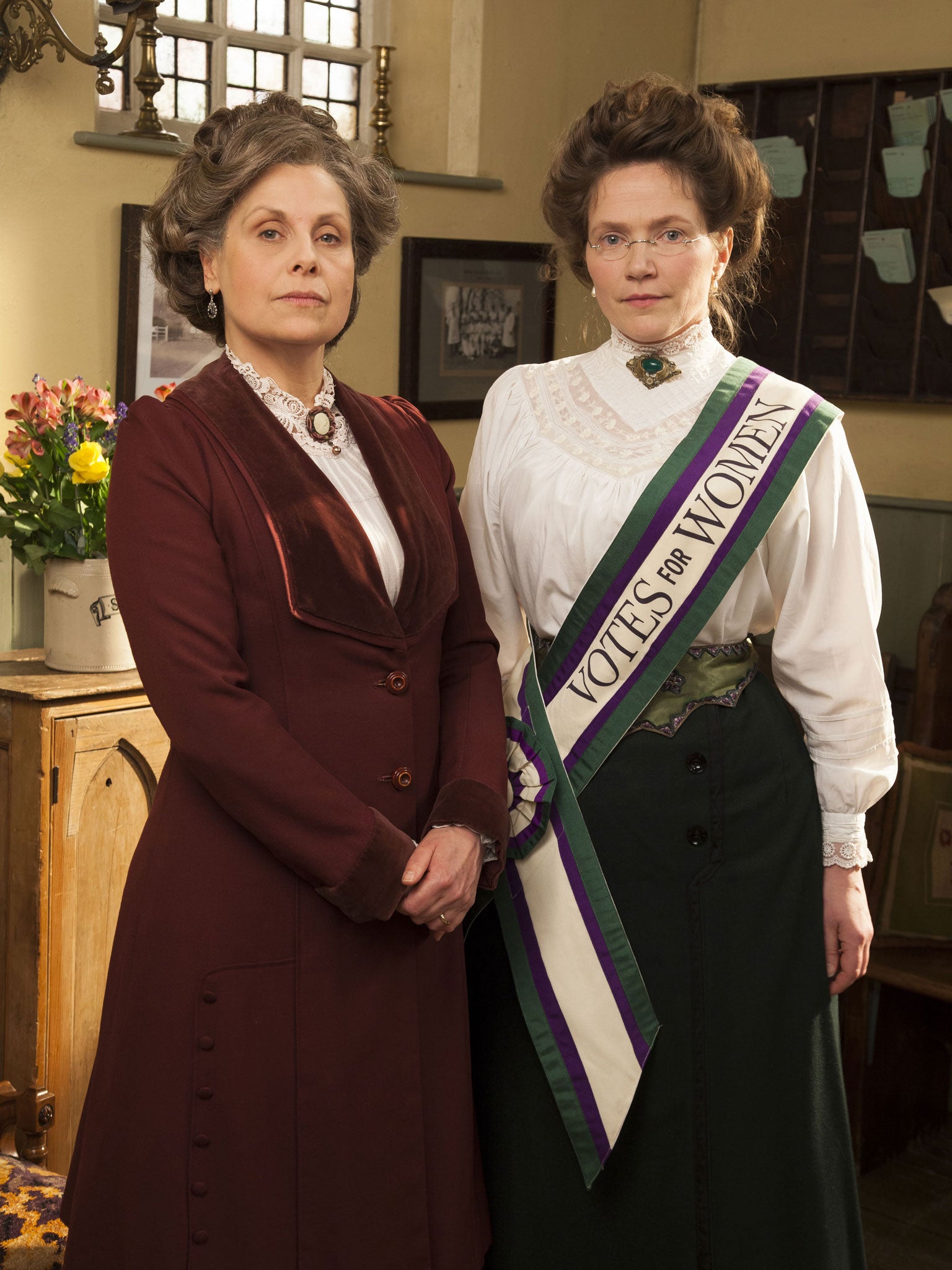TV review: The Americans and Up the Women - Women who kick ass and crochet? I'd vote for that
The early days of the suffragettes deserve better than a micro-budget sitcom on BBC4. At least ITV snuck a no-nonsense Soviet-agent housewife into its schedule last night

Your support helps us to tell the story
From reproductive rights to climate change to Big Tech, The Independent is on the ground when the story is developing. Whether it's investigating the financials of Elon Musk's pro-Trump PAC or producing our latest documentary, 'The A Word', which shines a light on the American women fighting for reproductive rights, we know how important it is to parse out the facts from the messaging.
At such a critical moment in US history, we need reporters on the ground. Your donation allows us to keep sending journalists to speak to both sides of the story.
The Independent is trusted by Americans across the entire political spectrum. And unlike many other quality news outlets, we choose not to lock Americans out of our reporting and analysis with paywalls. We believe quality journalism should be available to everyone, paid for by those who can afford it.
Your support makes all the difference.Is it just me or did anyone else experience a time warp last night on the sofa? Just me? Let me explain. ITV's new American import, The Americans, is set in the 1980s. And, judging by its first episode, its makers probably think Cagney and Lacey was the high water mark of US television drama. For that matter, when was the last time BBC1 or ITV1 committed a chunk of Saturday night to a big brassy American show? For a moment – and I could be wrong about this – it felt as if I was watching an Eighties-style show set in the Eighties being broadcast like it was … well, I've already laboured the point.
The premise – Soviet spies passing as Americans in Washington DC! – is grabby. The spies, Philip and his wife Elizabeth (Matthew Rhys and Keri Russell, inset right) live with their two children in suburbia. He's a chirpy businessman, she's a fretful housewife, and by the end of the opening chase they had a Soviet defector tied up in the boot of their car while they doled out homework tips that were perhaps too well appraised of Carter-era geopolitics. As such, you would say that the show rewinds current American fears about "the enemy within" back to the cosy-seeming polarities of the Cold War. But it was in too much of a hurry to dwell on anything as beard-strokey as that. The opening episode packed more into its 90 minutes than you'd have found in a season of The Sopranos.
Having got their man, Philip and Elizabeth argued about doing their duty and packing the high-profile defector back to the Kremlin, or handing him over to the CIA and defecting themselves.
In flashbacks so hammy they ought to be classified material, we learned how they were recruited in the Motherland, before washing up in the land of the Yankee in 1965 with distinctly non-Russian dentition and a wide-eyed delight at the air-conditioning. A decade and a half later and Philip still had a twinkle in his eye for cowboy boots and the star-spangled banner, to the distaste of Comrade Elizabeth.
It's snappy and lightweight, and with a swagger you might recall from a typical episode of, say, Moonlighting. Episode one even had the gall to tee-up a car sex scene with a snatch of Phil Collins on the soundtrack, and get away with it. The quick-change disguise scenes, iffy wigs and all, were also what you might generously call a homage to The Man From UNCLE. In all this, the drama was helped by Matthew Rhys, a performer who could charm the most staunch KGB man into a pair of Levis.
This shamelessness sometimes tipped into implausibility, but at least the writers had the grace to clear their throats. When a CIA counter-intelligence expert moved in next door with his family, Philip worried that their cover was blown, but not so Elizabeth: "It's probably a coincidence". You think?
The episode concluded with some lumbering exchanges, explicitly looking ahead to the ideological deep freeze between the Soviet Union and the USA in the Eighties. But among this froth was the grist that might well pull an audience through 13 episodes: the tension of a marriage in which the wife has to oblige as the occasional no-holds barred honey-trap, and the troubling future for those vital accessories of the all-American family, the kids.
How many Edwardians does it take to change a light bulb? About eight if Up the Women (**) is anything to go by, though as one of them said: "It's hard to see how this would replace the candle." Jessica Hynes wrote in this newspaper last week that her three-part sitcom about a group of failed suffragettes was originally intended as a film. It says nothing too complimentary about our priorities that the project ended up as a BBC4 micro-budget three-parter, shot in front of a studio audience in a two-room set.
As it was, the traces of its film script origins were detectable in Hynes's performance as the clever but timid Margaret. She proposed that the Banbury Intricate Craft Circle revitalise itself as the Banbury Intricate Craft Circle Politely Request Women's Suffrage. Hynes appeared to be acting in the uplifting, thoughtful movie that you would never have quite got round to seeing at your local arthouse cinema. Oddly, though, she seemed to be surrounded by performances, from Rebecca Front, Vicki Pepperdine et al, that were sketch-show broad.
The script, too, careered between these two registers. Still, the brilliant Pepperdine had some funny false teeth and mugged her way through a quite silly knob gag. That just about got my floating vote.
Join our commenting forum
Join thought-provoking conversations, follow other Independent readers and see their replies
Comments